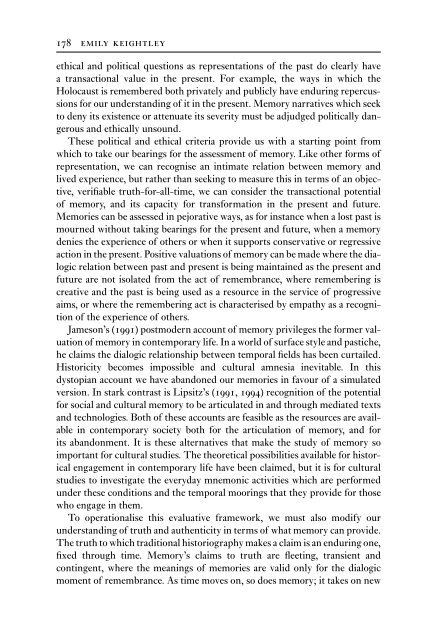Research Methods for Cultural Studies
Research Methods for Cultural Studies
Research Methods for Cultural Studies
Create successful ePaper yourself
Turn your PDF publications into a flip-book with our unique Google optimized e-Paper software.
178 emily keightley<br />
ethical and political questions as representations of the past do clearly have<br />
atransactional value in the present. For example, the ways in which the<br />
Holocaust is remembered both privately and publicly have enduring repercussions<br />
<strong>for</strong> our understanding of it in the present. Memory narratives which seek<br />
to deny its existence or attenuate its severity must be adjudged politically dangerous<br />
and ethically unsound.<br />
These political and ethical criteria provide us with a starting point from<br />
which to take our bearings <strong>for</strong> the assessment of memory. Like other <strong>for</strong>ms of<br />
representation, we can recognise an intimate relation between memory and<br />
lived experience, but rather than seeking to measure this in terms of an objective,<br />
verifiable truth-<strong>for</strong>-all-time, we can consider the transactional potential<br />
of memory, and its capacity <strong>for</strong> trans<strong>for</strong>mation in the present and future.<br />
Memories can be assessed in pejorative ways, as <strong>for</strong> instance when a lost past is<br />
mourned without taking bearings <strong>for</strong> the present and future, when a memory<br />
denies the experience of others or when it supports conservative or regressive<br />
action in the present. Positive valuations of memory can be made where the dialogic<br />
relation between past and present is being maintained as the present and<br />
future are not isolated from the act of remembrance, where remembering is<br />
creative and the past is being used as a resource in the service of progressive<br />
aims, or where the remembering act is characterised by empathy as a recognition<br />
of the experience of others.<br />
Jameson’s (1991) postmodern account of memory privileges the <strong>for</strong>mer valuation<br />
of memory in contemporary life. In a world of surface style and pastiche,<br />
he claims the dialogic relationship between temporal fields has been curtailed.<br />
Historicity becomes impossible and cultural amnesia inevitable. In this<br />
dystopian account we have abandoned our memories in favour of a simulated<br />
version. In stark contrast is Lipsitz’s (1991, 1994) recognition of the potential<br />
<strong>for</strong> social and cultural memory to be articulated in and through mediated texts<br />
and technologies. Both of these accounts are feasible as the resources are available<br />
in contemporary society both <strong>for</strong> the articulation of memory, and <strong>for</strong><br />
its abandonment. It is these alternatives that make the study of memory so<br />
important <strong>for</strong> cultural studies. The theoretical possibilities available <strong>for</strong> historical<br />
engagement in contemporary life have been claimed, but it is <strong>for</strong> cultural<br />
studies to investigate the everyday mnemonic activities which are per<strong>for</strong>med<br />
under these conditions and the temporal moorings that they provide <strong>for</strong> those<br />
who engage in them.<br />
To operationalise this evaluative framework, we must also modify our<br />
understanding of truth and authenticity in terms of what memory can provide.<br />
The truth to which traditional historiography makes a claim is an enduring one,<br />
fixed through time. Memory’s claims to truth are fleeting, transient and<br />
contingent, where the meanings of memories are valid only <strong>for</strong> the dialogic<br />
moment of remembrance. As time moves on, so does memory; it takes on new


